Current issue
Archive
Manuscripts accepted
About the Journal
Editorial office
Editorial board
Section Editors
Abstracting and indexing
Subscription
Contact
Ethical standards and procedures
Most read articles
Instructions for authors
Article Processing Charge (APC)
Regulations of paying article processing charge (APC)
ONCOLOGY / RESEARCH PAPER
lncRNA EGOT across cancers: TCGA analysis
1
Greater Poland Cancer Center, Research and Implementation Unit, Garbary Street 15, 61-866 Poznań, Poland, Poland
2
Laboratory of Cancer Genetics, Greater Poland Cancer Center; Garbary Street 15, 61- 866 Poznań, Poland
Greater Poland Cancer Center, Research and Implementation Unit, Garbary Street 15, 61-866 Poznań, Poland
Institute of Human Biology and Evolution, Faculty of Biology, Adam Mickiewicz University, Uniwersytetu Poznańskiego 6, 61-614 Poznań, Poland, Poland
3
Microbiology Laboratory, Greater Poland Cancer Centre, Garbary Street 15, 61-866 Poznań, Poland
Greater Poland Cancer Center, Research and Implementation Unit, Garbary Street 15, 61-866 Poznań, Poland, Poland
4
Chair and Department of Cell Biology, Poznan University of Medical Sciences, 60-806, Poznan, Poland;, Poland
5
Radiation Protection Department, Greater Poland Cancer Centre, Garbary Street 15, 61-866 Poznań, Poland, Poland
6
Department of Tumor Pathology and Prophylaxis, Greater Poland Cancer Center, Garbary Street 15, 61-866 Poznan, Poland, Poland
7
Department of Cancer Immunology, Chair of Medical Biotechnology, Poznan University of Medical Sciences, 8 Rokietnicka Street, 60-806 Poznań, Poland
Department of Diagnostics and Cancer Immunology, Garbary Street 15, 61-866 Poznań, Poland, Poland
8
Department of Laboratory Diagnostics, Greater Poland Cancer Centre, Poznan, Poland, Poland
9
Department of Tumor Pathology and Prophylaxis, Greater Poland Cancer Center, Garbary Street 15, 61-866 Poznan, Poland
Department of Tumor Pathology and Prophylaxis, Poznan University of Medical Sciences, Garbary Street 15, 61-866 Poznań, Poland, Poland
10
Department of Clinical Oncology, Greater Poland Cancer Center, Poznan, Poland
Electroradiology Department, University of Medical Sciences, Poznan, Poland, Poland
11
Electroradiology Department, University of Medical Sciences, Poznan, Poland
Radiotherapy Department II, Greater Poland Cancer Center,Garbary 15, Poznan, Poland, Poland
Submission date: 2024-08-07
Final revision date: 2025-05-07
Acceptance date: 2025-06-01
Online publication date: 2025-08-19
Corresponding author
Tomasz Kolenda
Greater Poland Cancer Center, Research and Implementation Unit, Garbary Street 15, 61-866 Poznań, Poland, Garbary 15, 61-866, Poznań, Poland
Greater Poland Cancer Center, Research and Implementation Unit, Garbary Street 15, 61-866 Poznań, Poland, Garbary 15, 61-866, Poznań, Poland
KEYWORDS
TOPICS
ABSTRACT
Introduction:
long-non-coding RNAs (lncRNAs) are important new players in the epigenetic control of cellular phenotypes. One of the lncRNAs is the eosinophil granule ontogeny transcript (EGOT), in which changes in expression levels are correlated with pathological conditions, including tumorigenesis and viral infections. In spite of many studies, the biological role and diagnostics utility of EGOT remains unclear.
Material and methods:
EGOT was analyzed based on the TCGA, including pathological and clinical features, cellular pathways, and genomic and cellular changes.
Results:
We observed an association of higher EGOT expression with better survival in breast invasive carcinoma (BRCA), head and neck squamous cell carcinoma (HNSC), kidney renal clear cell carcinoma (KIRC) and worse patients' survival for liver hepatocellular carcinoma (LIHC). Expression levels of EGOT differ in the case of HNSC, KIRC and LIHC. Critical cellular pathways and processes are changed depending on the EGOT. Moreover, immune profile, cancer subtypes, and differences in the proliferation, wound healing ability, stromal fraction, and intratumor heterogeneity depending on these lncRNA levels were noticed and differ mostly for BRCA and KIRC.
Conclusions:
EGOT seems to be a potential prognostic biomarker in clinical use. One of the possibilities that connected all of the analyzed types of cancers and changes in EGOT expression is viral activity and immunological response to viral infection.
long-non-coding RNAs (lncRNAs) are important new players in the epigenetic control of cellular phenotypes. One of the lncRNAs is the eosinophil granule ontogeny transcript (EGOT), in which changes in expression levels are correlated with pathological conditions, including tumorigenesis and viral infections. In spite of many studies, the biological role and diagnostics utility of EGOT remains unclear.
Material and methods:
EGOT was analyzed based on the TCGA, including pathological and clinical features, cellular pathways, and genomic and cellular changes.
Results:
We observed an association of higher EGOT expression with better survival in breast invasive carcinoma (BRCA), head and neck squamous cell carcinoma (HNSC), kidney renal clear cell carcinoma (KIRC) and worse patients' survival for liver hepatocellular carcinoma (LIHC). Expression levels of EGOT differ in the case of HNSC, KIRC and LIHC. Critical cellular pathways and processes are changed depending on the EGOT. Moreover, immune profile, cancer subtypes, and differences in the proliferation, wound healing ability, stromal fraction, and intratumor heterogeneity depending on these lncRNA levels were noticed and differ mostly for BRCA and KIRC.
Conclusions:
EGOT seems to be a potential prognostic biomarker in clinical use. One of the possibilities that connected all of the analyzed types of cancers and changes in EGOT expression is viral activity and immunological response to viral infection.
Share
RELATED ARTICLE
We process personal data collected when visiting the website. The function of obtaining information about users and their behavior is carried out by voluntarily entered information in forms and saving cookies in end devices. Data, including cookies, are used to provide services, improve the user experience and to analyze the traffic in accordance with the Privacy policy. Data are also collected and processed by Google Analytics tool (more).
You can change cookies settings in your browser. Restricted use of cookies in the browser configuration may affect some functionalities of the website.
You can change cookies settings in your browser. Restricted use of cookies in the browser configuration may affect some functionalities of the website.



